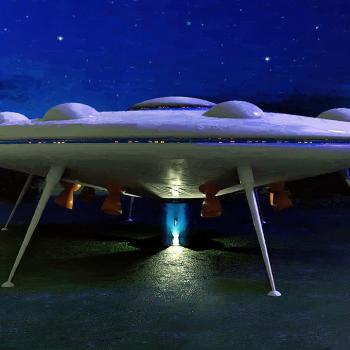Next come a series of brilliant visions, rich in light, sound, and beautifully peaceful forms of Buddhas. If our consciousness remains with the peaceful forms of Buddhas -- and we are able to recognize them as the liberated nature of our own mind -- then we will be drawn on until we come, once again, face to face with Reality. If we fail to ‘recognize' these peaceful Buddhas and become attracted by the relatively dull visions of rebirth in the six ‘realms' of existence, a new phase unfolds. The attraction of the dull lights reflects the domination of the tendencies, some positive and some negative, that will eventually lead to rebirth.
Next come a variety of visions, many of which are of a terrifying nature. They are terrifying because Reality is frightening to those who are strongly attached to a fixed way or being. However, even in this phase, liberation is possible. We have only to realize that these visions are a distortion of Reality caused by habitual tendencies. After a series of visions in which the unconscious tendencies take an ever stronger hold over our mind, we start to move toward the place of rebirth, and eventually see our parents copulating. If one is attracted to the female, one will be reborn male; if one is drawn to the male, then one will be reborn female. As we try to squeeze between the two parents we fall into unconsciousness and enter the womb. After a period of time we are reborn, but in what sort of state?
Since our future birth is determined by the tendencies that are established or strengthened in the course of this life, the way we act in this life is directly responsible for the type of life that we will experience in the future. The correspondence between an act and its effect on the individual's future birth is therefore of crucial importance. Buddhist ethics is based on this correspondence. A good -- or ‘skillful' -- act is one that gives rise to a happy future birth; unskillful actions lead to a painful future birth. Through our actions in this life we literally create the worlds in which we are to be born.
Normally, it seems, beings are born in very much the same sort of world, and state, as that in which they died. The habits and tendencies associated with the previous life are generally strong enough to ensure that they will ‘choose' to return to a similar way of being. For human beings, however, who are able to exercise a high degree of choice during their life, the situation can be quite complex. Some people seem to act rather like animals, having little self-consciousness and being interested only in sleep, food, and sex. Such people may well be on their way to an animal rebirth. Others may be refining and purifying their being and, as a result of developing new tendencies, may be reborn in the higher realms of the devas, or ‘gods'.
A life dominated by acts of cruel violence and blatant disregard of the fundamental empathy between human beings could lead to rebirth in a hell realm. If a strong neurotic tendency is indulged continuously, then that person could be reborn as a hungry ghost, always craving and yet never satisfied. A life dominated by aggressive competitiveness will lead to rebirth in a realm of warring gods.
The principle that habitual activities can create a world is of course observable within this life, at least on the psychological level. A generous person develops an openness and expansiveness in his or her nature, while continuous miserly actions give rise to a closed and defensive personality. But Buddhism takes this principle beyond the level of psychology and applies it to the individual as he or she passes from one physical existence to the next.
Broadly speaking, a being can be reborn in one of six realms: the human realm, the realm of the gods, that of animals, hungry ghosts, titans, or denizens of hell. In none of these realms is life eternal: the principle of impermanence holds true for them all. The worlds of gods and humans are said to be happy, but the remaining four are said to be painful. To be reborn as a human being is considered to be the ideal so far as spiritual life is concerned; the gods are far too happy to go searching for the highest happiness, while those in hell are too preoccupied and weakened by their suffering to raise themselves higher.
The Buddhist principle of rebirth can be summarized thus: Our actions in this life modify the unconscious tendency-patterns inherited from our previous life. We experience these tendencies as a sense of self that survives the death of the physical body. After a certain period of time these tendencies manifest in a new form by combining with physical factors. The process of life, death, and rebirth continues unendingly.
This is the framework in which the spiritual life is lived. The individual thus tries to bring conscious awareness to deeper and deeper levels of the mind, thereby liberating himself from the dominance of unconscious tendencies and the fixed experience of selfhood that they produce. By loosening the knot of unconscious tendencies we can become free; the unending cycle of rebirths comes not exactly to an end, but dissolves into an experience of Reality, which is beyond space and time.
 This article was first published by The Friends of the Western Buddhist Order (FWBO) and is reprinted with permission.
This article was first published by The Friends of the Western Buddhist Order (FWBO) and is reprinted with permission.
Manjuvajra is a Buddhist monk and retreat center director at Guhyaloka Buddhist Community in Alicante, Spain. He is a frequent contributor to FWBO.org.




